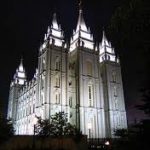by Marlena Tanya Muchnick
LDS author, speaker, researcher
 The Pew Research Center’s Forum on Religion & Public Life, a project of the Pew Research Center, recently held a roundtable discussion with journalists, scholars and policy experts on some of the latest research on Latter-Day Saints (Mormons) and their place in American society and public life. The study took six months. A 14-page questionnaire was composed about activities of service by volunteers. The report centered upon the service and volunteering work Mormons engage in. Parallels and differences between Mormons, Evangelicals and Orthodox Jews and in several categories were discussed. Paying of dues, the principle of tithing and marrying within the faith were among the interesting topics. The Pew Report discovered that both religions scored high on the “dimensions of the familiar believing, belonging, behaving triad”.
The Pew Research Center’s Forum on Religion & Public Life, a project of the Pew Research Center, recently held a roundtable discussion with journalists, scholars and policy experts on some of the latest research on Latter-Day Saints (Mormons) and their place in American society and public life. The study took six months. A 14-page questionnaire was composed about activities of service by volunteers. The report centered upon the service and volunteering work Mormons engage in. Parallels and differences between Mormons, Evangelicals and Orthodox Jews and in several categories were discussed. Paying of dues, the principle of tithing and marrying within the faith were among the interesting topics. The Pew Report discovered that both religions scored high on the “dimensions of the familiar believing, belonging, behaving triad”.
Read the report at their website:
They compared dues paying and tithing practices among the two religions. Orthodox Jews are required to pay for their membership in the synagogue they attend. These monies support the rabbinic staff and expenses related to the building, its upkeep, office staff, holiday celebration and preparation and the like. Members are asked to contribute extra funds as well during the year “voluntarily” as an equivalent of “an offering pledge”
Comparatively, or rather, by contrast, “Mormons do not pay dues to belong to a local congregation” because they belong to a worldwide church. The are asked to contribute 10% of their gross “increase” each year – usually this is done paycheck to paycheck for many – and members are told it is their decision to make. Their decision will determine if they are members in good standing and therefore are eligible to enter their temples. One of the requirements for being a member in good standing is the paying of a full tithe. In the LDS church all tithes are self-reported. There is no oversight.

The Pew Report found that both Latter-day Saints and Orthodox Jews “exhibit very high levels of religious involvement. They attend church regularly, say they pray at frequent intervals – much more so that other groups. It’s also true politically”.
As a Jew who was raised in an Orthodox environment for a number of years, I can easily recall my father writing checks to our synagogue to help with building expenses that never seemed completed. There were always requests for more contributions during religious services and sometimes my parents worried they wouldn’t have enough for their own expenses and the raising of their own two children. When my parents finally divorced, my mother could not afford the dues and subsequently fell away from synagogue out of a sense of shame that she could no longer pay her way. Reform Jewish congregations were less demanding but they still required some payments during the year for attendance. My father paid what was required to reserve his seat at High Holy Day services during the year until he, too, thought it too expensive and stopped attending altogether.
This is not to say the paying of religious dues or tithes and offerings is wrong. It is how these institutions survive, serve and prosper in society. Offering one’s funds as a way of validation of membership is a sacrifice to righteous living in a religious environment. Paying tithes the Latter-day Saint way, however, encourages each individual member to consult his conscience privately and act accordingly. My own experience with tithing is a very positive one. I want all the blessings of membership that I can get!
Temple attendance is for me a mandatory part of my life experience, so I tithe accordingly, as to millions of other members. Our monies go to support the church across the world, build the increasing temples, feed the homeless and less fortunate, etc. Our leaders are lay people and most church members are volunteers, including all missionaries. Monetary concerns are kept in the
background. Emphasis is always placed upon our faith and works in the behalf of others. Greg Smith of the Pew Forum stated: “Helping the poor is essential to what it means to being a good Mormon.”
William Galston of the Brookings Institution noted that Latter-day Saints and Orthodox cultures are in numerous ways similar. Both religions have been persecuted. Both believe in marrying within the religion and having large families, though politically they are at opposite ends of the spectrum. And both are here to stay.
The Pew Forum does have publications including public opinion polls, demographic reports, research studies, event transcripts and interviews about the Jewish faith and its members. Click on www.pewforum.org for details.
Additional Resources:
